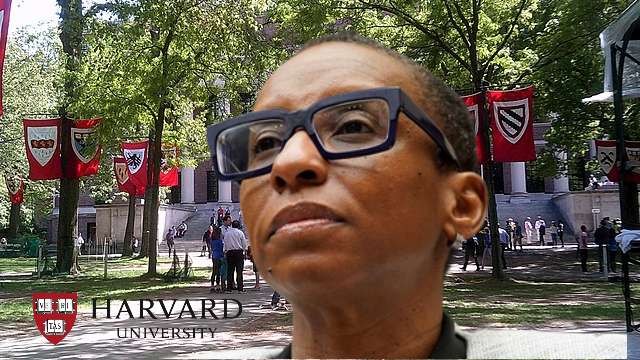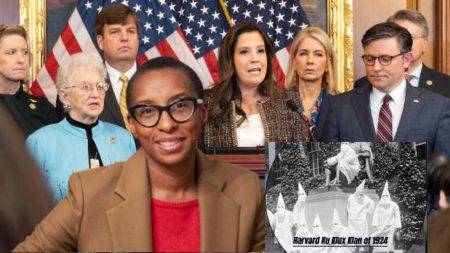Criticism and calls for Claudine Gay‘s resignation have surged in the aftermath of her controversial appearance in a congressional hearing on antisemitism. The Harvard President faced intense scrutiny as more than 70 members of Congress, predominantly Republicans, called for her immediate resignation. The contentious hearing, led by Republican congresswoman Elise Stefanik, gained widespread attention due to Stefanik’s combative questioning of Claudine Gay and other university administrators.
Stefanik, in a Fox News interview, took credit for what she termed as “accountability” in the wake of Gay’s resignation. The congresswoman asserted that the hearing forced a closer examination of Claudine Gay‘s role at Harvard, indicating that the intense public scrutiny triggered by the congressional session played a pivotal role in the calls for resignation. The political undertones of the situation became more apparent as Stefanik framed the resignation as a triumph, emphasizing the impact of congressional actions on academic leadership.
Republican Response and Polarization: Call for Claudine Gay Resignation
Elise Stefanik’s vocal role in the controversy highlights the deeply polarized political landscape surrounding Gay’s resignation. Stefanik, a prominent Republican figure, seized the opportunity to leverage the congressional hearing as a platform to rally against Gay’s leadership at Harvard.
The broader political narrative surrounding the controversy suggests that the intensification of calls for Claudine Gay‘s resignation may be rooted in partisan politics, with Republicans seizing on her perceived missteps during the congressional hearing. This has not only inflamed tensions within academic circles but also fueled debates on topics ranging from antisemitism to college free speech, all converging on the fate of one Black woman in a high-profile leadership position.
Critiques of Affirmative Action Took advantage Claudine Gay‘s Capitol Stumbles
Monica Clark, president of the Harvard Black Alumni Society, and Keith Boykin, a Black Harvard Law alum and author, highlight the intersectionality of the controversy. Gay’s stumbles during the congressional testimony have become a focal point for critics of affirmative action and diversity initiatives. Boykin suggests that the past two weeks have seen a collision of volatile debates on antisemitism, college free speech, and the role of race in American society, all converging on the fate of one Black woman.
This intersectionality underscores the complexity of the situation, where political, racial, and academic factors intertwine to shape the public discourse surrounding Claudine Gay‘s resignation. The controversy surrounding her testimony and subsequent resignation serves as a flashpoint for broader conversations on race and diversity within academic institutions, raising questions about the challenges faced by Black women in leadership roles and the potential impact on affirmative action initiatives.

Conservative Activism and the Attack on Diversity Initiatives
The controversy surrounding Claudine Gay‘s resignation as the President of Harvard University has unveiled a broader political landscape where conservative activists spearheaded a campaign against her presidency. Critics, including Monica Clark and Keith Boykin, argue that Gay became a symbolic target not just due to her association with Harvard but as part of a broader effort to dismantle liberal arts education and challenge diversity, equity, and inclusion initiatives on college campuses.
The conservative activists leading the campaign against Gay contended that her appointment was not based on her extensive academic background and achievements but rather on her identity as a Black woman. This narrative highlights the broader challenges faced by leaders who aim to foster inclusivity in academic institutions and the increasing scrutiny of diversity initiatives by conservative groups. The controversy underscores a clash between those advocating for diversity and those opposing it, with the academic arena becoming a battleground for broader ideological conflicts.
Faculty Rally in Defense of University Independence
In response to the escalating attacks on Claudine Gay’s presidency, more than 700 faculty members issued a joint letter urging against her removal. The faculty members, representing a diverse range of disciplines, emphasized the importance of university independence and academic freedom. The letter, organized by History professor Maya R. Jasanoff, garnered 686 signatures and was presented to the Harvard Corporation.
The faculty’s appeal to defend the independence of the university underscores the perceived political motivations behind the calls for Claudine Gay‘s resignation. The letter explicitly rejects what it characterizes as politically motivated attacks on Harvard, positioning the controversy as a threat to the principles of academic freedom. This collective faculty response reflects a commitment to safeguarding the integrity of the university and resisting external pressures that may compromise its autonomy.
Right-Wing Backlash, Activist Role and Congressional Fallout
On Tuesday, Claudine Gay announced her resignation as Harvard University President, citing “tensions and divisions” stemming from allegations of plagiarism and fallout from her contentious congressional testimony. The announcement marks a significant and swift departure, with Claudine Gay holding the position for the shortest amount of time served by any president in Harvard’s history.
The abrupt resignation raises questions about the intersectionality of the controversies surrounding Gay, from allegations of plagiarism to the political fallout from her congressional testimony. The broader implications of her departure reverberate not only within Harvard but also across academic institutions facing increasing scrutiny over issues of diversity, academic freedom, and ideological clashes. The rapid developments in this story highlight the complex interplay of politics, academia, and cultural tensions, shaping the narrative surrounding the resignation of one of the nation’s leading university presidents.
Since her tumultuous Capitol Hill appearance, right-wing politicians have been relentless in their calls for the resignation or firing of Claudine Gay, the President of Harvard. The hard-right activist Christopher Rufo, appointed by Florida Governor Ron DeSantis to the board of New College, played a significant role in publicizing the anonymous complaints against Claudine Gay. The political fervor surrounding her intensified after the congressional hearing, with calls for her removal gaining traction within conservative circles.
U.S. House Resolution Calls for Resignation of Harvard President Claudine Gay
The U.S. House of Representatives of republican majority made a significant move on Wednesday by passing a bipartisan resolution calling for the resignation of Harvard President Claudine Gay. This development follows her controversial congressional testimony on campus antisemitism during last week’s hearing, where she, alongside MIT President Sally A. Kornbluth and University of Pennsylvania President Elizabeth Magill, faced scrutiny. The resolution, adopted in a 303-126 vote, also targets MIT President Kornbluth, adding to the mounting pressure on academic leaders in the wake of the contentious hearing.
The fallout from the resolution has been swift, with Magill resigning on Saturday in response to the backlash against her remarks. Despite this, Presidents Gay and Kornbluth remain in office, prompting Republican Representative Elise M. Stefanik, the sponsor of the resolution, to express determination with a post on X: “One down. Two to go.” The Harvard Corporation, the university’s highest governing body, broke its silence on Tuesday, publicly backing Gay and emphasizing unanimous support for her presidency.
Meanwhile, MIT’s governing board released a statement last Thursday backing Kornbluth. The resolution, spearheaded by Rep. Stefanik, denounces the presidents’ remarks at the hearing as “evasive and dismissive,” urging Kornbluth and Gay to follow Magill’s lead in stepping down. The resolution’s passage and subsequent responses reveal a complex and evolving situation that continues to reverberate through the academic and political spheres.
Resignation Motivations and Plagiarism Allegations
In her resignation letter, Gay, the first Black president of Harvard and the second woman to hold the position, cited the “best interests of Harvard” as the primary reason for stepping down. She expressed a desire to shift the focus back onto the institution rather than any individual during a challenging moment. The university is currently under investigation by the U.S. Department of Education for allegations of Islamophobia and anti-Semitic discrimination following the Hamas attack on Israel.
However, the controversy surrounding Gay goes beyond the political fallout from her Capitol Hill appearance. Plagiarism allegations played a significant role in her resignation, with complaints extending into both her dissertation and professional work. A December 11 complaint focused on her dissertation, while a subsequent December 19 complaint delved into her professional work, prompting calls for resignation from prominent figures in The New York Times and The Washington Post. By January 1, the number of plagiarism examples had reached 47, covering a substantial portion of Gay’s published work. The allegations became a critical factor in her decision to step down.

Harvard Corporation’s Response
In response to Claudine Gay’s resignation, the Harvard Corporation, the top governing body of fellows at the institution, issued a statement expressing acceptance “with sorrow.” The Corporation acknowledged Gay’s deep and selfless commitment to the institution and its mission. The statement highlighted the distress caused by doubt cast on Gay’s commitments to confronting hate and upholding scholarly rigor. The resignation, surrounded by controversies from political attacks to plagiarism allegations, reflects a challenging period for both Gay and Harvard University. The fallout raises questions about the intersection of politics, academic integrity, and leadership in one of the nation’s premier educational institutions.
Scripted Hearings Gave Republican Celebrations and Social Media Triumph
Gay and her colleague at Penn University seemingly fell into a trap set by Republicans, who were more interested in shaping the hearings into a narrative that cast colleges and universities as out-of-touch liberal bastions than genuinely addressing antisemitism. The strategic maneuvering by Republicans has highlighted a disconnect between the academic leadership and the political landscape, emphasizing the importance of a proactive approach in navigating such contentious issues. The unexpected turn of events serves as a cautionary tale for university leaders, urging them to anticipate and counteract political agendas that may overshadow the primary issues at hand.
The recent turn of events has left Republicans celebrating, particularly on social media, as they claim victory in what seems to be the culmination of their desires. The focus of their jubilation is the resignation of Harvard President Claudine Gay and her counterpart at Penn University. The GOP’s celebration is underscored by their successful manipulation of the narrative during recent hearings, steering the discourse away from combating antisemitism on campuses to portraying universities as elite liberal institutions detached from the American people. The unexpected fallout raises questions about the preparedness of university leaders in navigating politically charged environments.
Republican Motives on Antisemitism, Lessons Learned and Future Preparedness
Amid the celebrations, skepticism arises regarding the sincerity of the Republican Party’s commitment to combating antisemitism. Washington Post columnist Jennifer Rubin, in a January piece, pointed fingers at Donald Trump, his Maga followers, and Republicans who failed to condemn hate-filled rhetoric. She questioned the authenticity of the GOP’s stance on antisemitism, attributing the rise of antisemitism in the United States to right-wing Republicans. The intersection of political agendas and the fight against antisemitism brings to light the complexities surrounding genuine commitment and political posturing within the Republican Party.
The column by Jennifer Rubin emphasized the role of right-wing Republicans in contributing to the rise of antisemitism, citing their frequent references to George Soros, a Jewish Hungarian immigrant. Rubin’s critique places responsibility on Republican leaders, including House Speaker Kevin McCarthy, for their role in perpetuating hate-filled rhetoric. The focus on individual figures, coupled with political maneuvering during hearings, raises questions about the underlying motives and narratives employed by Republicans in shaping public opinion on university campuses and beyond.
The events leading to the resignation of Harvard President Claudine Gay underscore the importance of university leaders being better prepared to navigate politically charged situations. The fallout from the scripted hearings reveals a need for strategic planning and foresight to avoid being drawn into partisan narratives that distract from the core issues. As universities become battlegrounds for political agendas, leaders must prioritize a proactive and resilient approach to protect the integrity of academic institutions and ensure a focus on addressing crucial issues such as antisemitism on campuses. The lessons learned from this episode serve as a call to action for academic leaders nationwide to be vigilant and prepared in the face of complex political landscapes.
Table of Contents
Discover more from OGM News NG
Subscribe to get the latest posts sent to your email.














